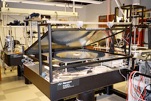
2006 November
...the science of metamaterials-the creation of artificial atoms with optical properties unlike those of any natural atom-is a door into a world so fantastic that it must surely be imaginary, and yet isn't. This spring, metamaterials pioneer John B. Pendry of Imperial College, London, along with David Schurig and David Smith of Duke University, and, independently, Ulf Leonhardt of the University of St. Andrews in Scotland showed that a shell of metamaterials can redirect light around an object and render it invisible-not just very dark (as in current stealth technology) but truly invisible...
2006 December
Science veered toward science fiction this year as physicists cobbled together the first rudimentary invisibility cloak. Although far from perfect--the ring-shaped cloak is invisible only when viewed in microwaves of a certain wavelength traveling parallel to the plane of the ring--the device could usher in a potentially revolutionary approach to manipulating electromagnetic waves.
2007 January
When a tabloid best known for topless pinups breaks a Science journal embargo to publish news of a major physics finding, you know the world has gone a little gaga. "Boffin invents invisibility cloak," blared British newspaper The Sun on October 19, reporting that physicists from Duke University and Imperial College London had designed radical new materials that can bend microwaves around an object so that they are neither absorbed nor scattered.

2006 October 21 and 31
2006 August
...Schurig recently sat down with technology editor R. Colin Johnson to describe how the cloaking device works, and what EEs can do to turn this science fiction idea into fact...
2007 February
To make something invisible is to make it seem transparent. The nested fiberglass cylinders pictured here, embossed with hundreds of split copper rings, do just that—at least in the microwave regime. The trick lies in the geometry of the split rings. Collectively, they deflect microwaves around the innermost cylinder and return the waves to their original paths on the other side, hiding whatever lies inside.





